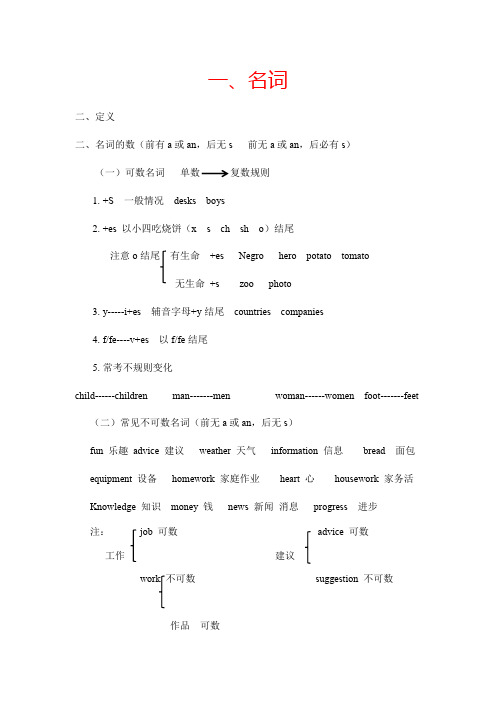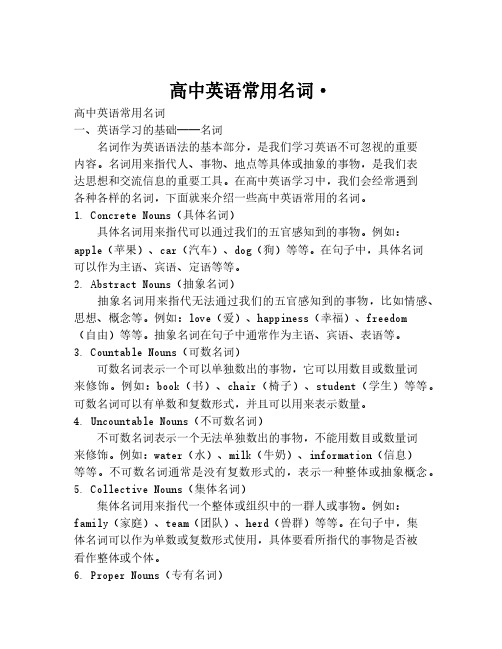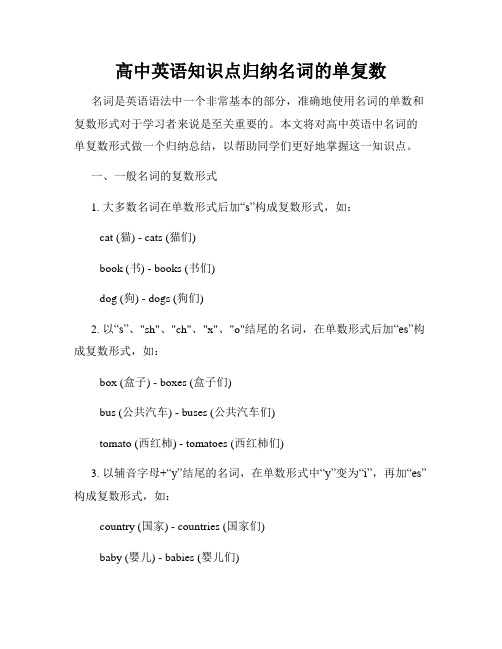高中常见不可数名词
高中英语常考不可数名词word版本

wealth
财富,富裕
friendship
友谊
energy
精力
homework
家庭作业
knowledge
知识
nature
自然
luck
运气
health
健康
technology
技能
courage
勇气
help
帮助
hope
希望
food
食物
wood
木材
scenery
风景
jewelry
珠宝
poetry
诗歌
evidence
fun
开心、快乐的事
What fun it is to do sth.!
furniture
家具
a set of furniture
news/information
/word
消息,新闻
WorБайду номын сангаас came that he won the first prize in the match.
baggage/luggage
行李
a piece of baggage/luggage
progress
进步
make great/rapid/some/no progress in sth.
practice
练习
Practice makes perfect.
work
工作
weather
天气
applause
掌声
a burst of applause一阵掌声
5
我们长期呆在校园里,没有工作收入一直都是靠父母生活,在资金方面会表现的比较棘手。不过,对我们的小店来说还好,因为我们不需要太多的投资。
常见常考不及物动词vs不可数名词

appear, disappear, hurry, die, rush,
2.stand(站), sit(坐), lie(躺)
3.live(居住,生存),talk, work, listen,
stay(停留,呆在), belong, exist(存在),
4. happen, occur, take place 等
2. I have made great progress in learning English recently! 3.gain a lot of information
高中英语常见常考VI.
英语语法原始 arrive, gather,
fall(摔倒,坠落), rise, walk, run,
11.No news is good news.
高中英语常见常考UN.
英语语法原始基石(一)
常见常考的不可数名词:
多为物质名词和抽象名词 fun, progress, information, equipment, advice, weather, furniture, work, money, traffic, news等
1.What fun it is to have a cold drink in hot summer!
4.much/ a lot of equipment
5. Would you like to give me some advice on how to improve my English? 6. What fine weather it is today! 7. much/ a lot of /a piece of furniture 8. We have done so much work in protecting the environment in the past ten years. 9.Time is money. 10. Nowadays, traffic is becoming heavier and heavier on the roads.
高中英语语法复习之不可数名词形容词副词最全讲解

高中英语培优补差不可数名词形容词副词篇A.基础复习(1):不可数名词不可数名词是指不能以数目来计算,不可以分成个体的概念、状态、品质、感情或表示物质材料的东西。
常用的不可数名词有:advice, news, weather, climate, information, baggage/luggage, wealth, paper, work, homework, housework, paperwork, (firework: 烟火; 烟花。
可数名词),equipment, room/space(空间), grammar, evidence, fun, practice, wood, progress, jewelry, furniture, cash, money, change(零钱。
作为“变化”讲时,有单复数。
),garbage/rubbish, cloth, clothing, ink, blood, bread, water, air, sweat, milk, tea, juice, beer, wine, rain, snow, ice, fog, soil, oil, silk, wool, sand, sugar, heat, soap, coal, cheese , meat, rice, wheat, corn, butter, soup, oxygen , gold, grass……, 食物,粮食,金属等。
waters: 水域; 领海; 海域。
paper: 报纸; 试卷; 答卷; 论文。
这时为可数名词。
hair : 头发。
指全部头发时为不可数名词; 指几根头发时为可数名词,要加s●不可数名词前不可以加:a/an these those many several (a) few 等。
可以加: the this that some any one’s much a little littlea lot of = lots of plenty of a good/great deal of不可数名词没有单数、复数,前面不可加a/an, 不可以给它们加s或者es。
高中英语名词考点

高中英语名词考点在高中英语的学习中,名词是一个重要的语法板块。
掌握好名词的相关考点,对于提升英语语言能力和应对考试都具有重要意义。
接下来,让我们一起深入探讨高中英语名词的常见考点。
一、名词的分类名词可以分为专有名词和普通名词。
专有名词指特定的人、地方、机构等的名称,如 China(中国)、New York(纽约)、Microsoft(微软)等,其首字母通常要大写。
普通名词又可以分为可数名词和不可数名词。
可数名词有单数和复数形式,如 book(书,单数)、books(书,复数)。
而不可数名词没有复数形式,如 water(水)、information(信息)。
二、可数名词的复数形式可数名词的复数形式变化规则多样。
一般情况下,直接在名词后加s,如 cats(猫)、dogs(狗)。
以 s、x、ch、sh 结尾的名词,加 es,如 buses(公共汽车)、boxes(盒子)、watches(手表)、dishes(盘子)。
以辅音字母+ y 结尾的名词,把 y 变为 i 再加 es,如 babies(婴儿)、cities(城市);但以元音字母+y 结尾的名词,直接加s,如 toys(玩具)、days(天)。
以 f 或 fe 结尾的名词,把 f 或 fe 变为 v再加 es,如 leaves(树叶)、knives(刀);但有些词直接加 s,如roofs(屋顶)。
还有一些不规则的名词复数形式需要特别记忆,如 man men(男人)、woman women(女人)、child children(孩子)、foot feet (脚)、tooth teeth(牙齿)等。
三、不可数名词的量化不可数名词不能用具体的数字来表示数量,但可以借助一些量词来量化。
常见的量词有piece(片、块、件)、bottle(瓶)、cup(杯)、glass(玻璃杯)、bag(袋)等。
例如,a piece of paper(一张纸)、a bottle of water(一瓶水)、two cups of coffee(两杯咖啡)。
高中语法专题解析名词的单复数所有格和分类

高中语法专题解析名词的单复数所有格和分类在高中语法学习中,名词的单复数、所有格和分类是一个重要的专题。
掌握好这些知识点,能够更准确地表达自己的意思,并提升写作和阅读的能力。
下面将对名词的单复数、所有格和分类进行解析。
一、名词的单复数名词是指人、事物、动物、地点等具体或抽象的事物的名称。
在英语中,名词有单数和复数两种形式,根据名词的形式变化,可以更恰当地表达数量或概念。
1. 单数形式名词的单数形式表示一个或单个事物。
通常,名词的单数形式是其原形,如“book”(书)、“cat”(猫)等。
2. 复数形式名词的复数形式表示多个事物。
在英语中,大多数名词的复数形式可以通过在单数形式后面加上“-s”或“-es”来构成。
例如,“books”(书籍)、“cats”(猫咪)等。
值得注意的是,名词的复数形式有一些特殊变化规则:- 以“s”、“x”、“ch”、“sh” 结尾的名词,复数形式直接加“-es”,如“boxes”(盒子)、“watches”(手表);- 以辅音字母+y结尾的名词,将“y”改为“i”,再加“-es”,如“flies”(苍蝇)、“berries”(浆果);- 以“f”或“fe” 结尾的名词,大多数变“f”为“v”,再加“-es”,如“leaves”(树叶)、“lives”(生活)。
二、名词的所有格名词的所有格用来表示所属关系。
在英语中,大多数名词的所有格可以通过在单数或复数名词后面加上“-’s”构成。
例如,“the boy’s book”(男孩的书)、“the students’ notebooks”(学生的笔记本)。
对于以“s”或“es”结尾的复数名词,只需在末尾加上“’”,而不再加上额外的“s”。
例如,“the cats’ food bowls”(猫的食盆)。
当名词是以不发音的“s”结尾时,可以根据个人偏好使用“-’s”或“-s’”。
例如,“James’s car”或“James’ car”(詹姆斯的车)。
高中英语名词

一、名词二、定义二、名词的数(前有a或an,后无s 前无a或an,后必有s)(一)可数名词单数复数规则1.+S 一般情况desks boys2.+es 以小四吃烧饼(x s ch sh o)结尾注意o结尾有生命+es Negro hero potato tomato无生命+s zoo photo3.y-----i+es 辅音字母+y结尾countries companies4.f/fe----v+es 以f/fe结尾5.常考不规则变化child------children man-------men woman------women foot-------feet (二)常见不可数名词(前无a或an,后无s)fun 乐趣advice 建议weather 天气information 信息bread 面包equipment 设备homework 家庭作业heart 心housework 家务活Knowledge 知识money 钱news 新闻消息progress 进步注:job 可数advice 可数工作建议work 不可数suggestion 不可数作品可数experience 经验(不可数) exercise 锻炼(不可数)经历(可数) 练习(可数)chicken 鸡肉(不可数) word 新闻,消息(不可数)小鸡(可数) 话,词(可数change 零钱(不可数)变化(可数)三、名词作定语1.man和woman有单复数变化例:men teachers women workers2.其他名词一般用单数例:apple trees coffee shops四、名词所有格1.有生命+’s (如果名词复数加s则直接加’)例:Lily’s trees’ women’s2.无生命用of (注意与汉语顺序相反)门的窗户the window of the door如果碰到名词+of+名词则需从后往前翻3.双重所有格a friend of mine a teacher of my sister’s五、涉及词性转换(一)动词变名词例如:Chengdu has dozens of new millionaires, Asia’s biggest building, and fancy new hotels. But for tourists like me, pandas are it top_____(attract).1)动词+enceexistence存在occurrence 发生reference 参考preference 偏好2)动词+anceacceptance 接受appearance 出现performance 履行tolerance 容忍enterance 进入assistance 帮助insurance 保险3)动词+tionproduction 生产introduction 介绍reduction减少prevention 阻止protection 保护invitation 邀请communication交流devotion致力competition竞争organization 组织contribution 贡献education教育pollution 污染4)动词+sionimpression 印象depression沮丧expression 表达expansion扩大decision 决定permission允许5)动词+mentagreement 同意development 发展punishment 惩罚treatment 对待settlement 定居achievement 成就improvement 改进encouragement鼓励6)其他grow-----growth die------death believe------belief succeed-----successstudy (动词学习)(名词研究)change 变化(动词、名词)(二)形容词变名词1)加ydifficult -----difficulty responsible-----responsibility similar-----similarity possible---- possibility honest-------- honesty2)加nesskind-----kindness ill-----illness aware------awareness3)加thwide----- width dead----death true------truth4)其他different-----difference able-----ability crowd (名词人群)(形容词拥挤的)(三)名词变名词science----scientist relation-----relationship六、考试题型及做题方法(一)语法填空如果给的词不是名词,但要填的词是名词,则根据上述方法进行变换如果所给词是名词,则可以考虑变复数或者所有格练习:1.In addition to their simple beauty, what makes the adobe dwellingsadmirable is their ____ (able) to “air condition”a house without using electric equipment.2.The nursery team switches him every few ____( day) with his sister. Then, handlethe most important tasks first so you’ll feel a real sense of ____ (achieve).3.Recent (study) show that we are far more productive at work if we takeshort breaks regularly.4.Some people think that the great Chinese scholar Confucius, who lived fromroughly 551 to 479 B.C. , influenced the (develop)of chopsticks.5.This trend, which was started by the medical community(医学界)as a methodof fighting heart disease, has had some unintended side (effect) such as overweight and heart disease — the very thing the medical community was trying to fight.6. It ran for just under seven kilometers and allowed people to avoid terrible ____(crowd) on the roads above as they travelled to and from work.7. This development was only possible with the _____ (introduce) of electric-powered engines and lifts.8. She is determined to carry on with her (educate).9. She has turned down several (invitation) to star at shows in order to concentrate on her studies.10. Two of the authors of the review also made a study published in 2014 that showeda mere five to 10 minutes day of running reduced the risk of heart disease and early deaths from all ________(cause).11. This switch has decreased _______ (pollute) in the country's major lakes andreservoirs and made drinking water safer for people.12. My name is Mireya Mayor. I'm a ________(science)who studies animals such as apes and monkeys.13. In recent years some Inuit people in Nunavut have reported increases in bear sightings around human settlements, leading to a (believe) that populations are increasing.14. When they were free from work,they invited us to local events and let us know of an interesting (compete)to watch,together with the story behind it.15. I'd skipped nearby Guilin,a dream place for tourists seeking the limestone mountain tops and dark water of the Li River that are pictured by artists in so many Chinese (painting).16. I had many wonderful (experience),but I also had a sad one.(二)改错如果是可数名词,前面没有a/an, 那么需要在后面加s如果是不可数名词,那么后面一定不能加s注意词性转换练习:1. The film was very good,but I didn't enjoy it because there were some problem in the cinema.2. I always have enough food to eat,a big room to live in,and beautiful cloth to wear.3. Those students are going to call on woman scientists tomorrow4. I've made some progresses in my listening and speaking.5. If you go on a trip abroad,we can broaden our view and gain knowledges we cannot get from books.6. The airs we breathe in is getting dirtier and dirtier.重点:可数名词单复数规则常考不可数名词词性转换。
高中英语常用名词·

高中英语常用名词·高中英语常用名词一、英语学习的基础——名词名词作为英语语法的基本部分,是我们学习英语不可忽视的重要内容。
名词用来指代人、事物、地点等具体或抽象的事物,是我们表达思想和交流信息的重要工具。
在高中英语学习中,我们会经常遇到各种各样的名词,下面就来介绍一些高中英语常用的名词。
1. Concrete Nouns(具体名词)具体名词用来指代可以通过我们的五官感知到的事物。
例如:apple(苹果)、car(汽车)、dog(狗)等等。
在句子中,具体名词可以作为主语、宾语、定语等等。
2. Abstract Nouns(抽象名词)抽象名词用来指代无法通过我们的五官感知到的事物,比如情感、思想、概念等。
例如:love(爱)、happiness(幸福)、freedom(自由)等等。
抽象名词在句子中通常作为主语、宾语、表语等。
3. Countable Nouns(可数名词)可数名词表示一个可以单独数出的事物,它可以用数目或数量词来修饰。
例如:book(书)、chair(椅子)、student(学生)等等。
可数名词可以有单数和复数形式,并且可以用来表示数量。
4. Uncountable Nouns(不可数名词)不可数名词表示一个无法单独数出的事物,不能用数目或数量词来修饰。
例如:water(水)、milk(牛奶)、information(信息)等等。
不可数名词通常是没有复数形式的,表示一种整体或抽象概念。
5. Collective Nouns(集体名词)集体名词用来指代一个整体或组织中的一群人或事物。
例如:family(家庭)、team(团队)、herd(兽群)等等。
在句子中,集体名词可以作为单数或复数形式使用,具体要看所指代的事物是否被看作整体或个体。
6. Proper Nouns(专有名词)专有名词用来指代特定的人、地点、组织或事物,它们通常以大写字母开头。
例如:John(约翰)、London(伦敦)、Microsoft(微软)等等。
高中英语知识点归纳名词的单复数

高中英语知识点归纳名词的单复数名词是英语语法中一个非常基本的部分,准确地使用名词的单数和复数形式对于学习者来说是至关重要的。
本文将对高中英语中名词的单复数形式做一个归纳总结,以帮助同学们更好地掌握这一知识点。
一、一般名词的复数形式1. 大多数名词在单数形式后加“s”构成复数形式,如:cat (猫) - cats (猫们)book (书) - books (书们)dog (狗) - dogs (狗们)2. 以“s”、"sh"、"ch"、"x"、"o"结尾的名词,在单数形式后加“es”构成复数形式,如:box (盒子) - boxes (盒子们)bus (公共汽车) - buses (公共汽车们)tomato (西红柿) - tomatoes (西红柿们)3. 以辅音字母+“y”结尾的名词,在单数形式中“y”变为“i”,再加“es”构成复数形式,如:country (国家) - countries (国家们)baby (婴儿) - babies (婴儿们)party (派对) - parties (派对们)4. 以“f”或“fe”结尾的名词,改“f”或“fe”为“v”,再加“es”构成复数形式,如:leaf (叶子) - leaves (叶子们)knife (刀) - knives (刀们)half (一半) - halves (一半们)5. 一些名词在单复数形式上没有变化,如:sheep (绵羊) - sheep (绵羊们)fish (鱼) - fish (鱼们)Chinese (中国人) - Chinese (中国人们)二、不规则名词的复数形式1. 以“oo”结尾的名词,在单数形式中“oo”变为“ee”构成复数形式,如:goose (鹅) - geese (鹅们)tooth (牙) - teeth (牙齿)2. 以“us”结尾的名词,在单数形式中“us”变为“i”构成复数形式,如:cactus (仙人掌) - cacti (仙人掌们)fungus (真菌) - fungi (真菌们)3. 一些名词的复数形式完全不规则,需要进行记忆,如:man (男人) - men (男人们)woman (女人) - women (女人们)child (孩子) - children (孩子们)person (人) - people (人们)三、集体名词的单复数形式集体名词是指代表示群体的名词,根据上下文中群体的数量可以选择单数或复数形式。
